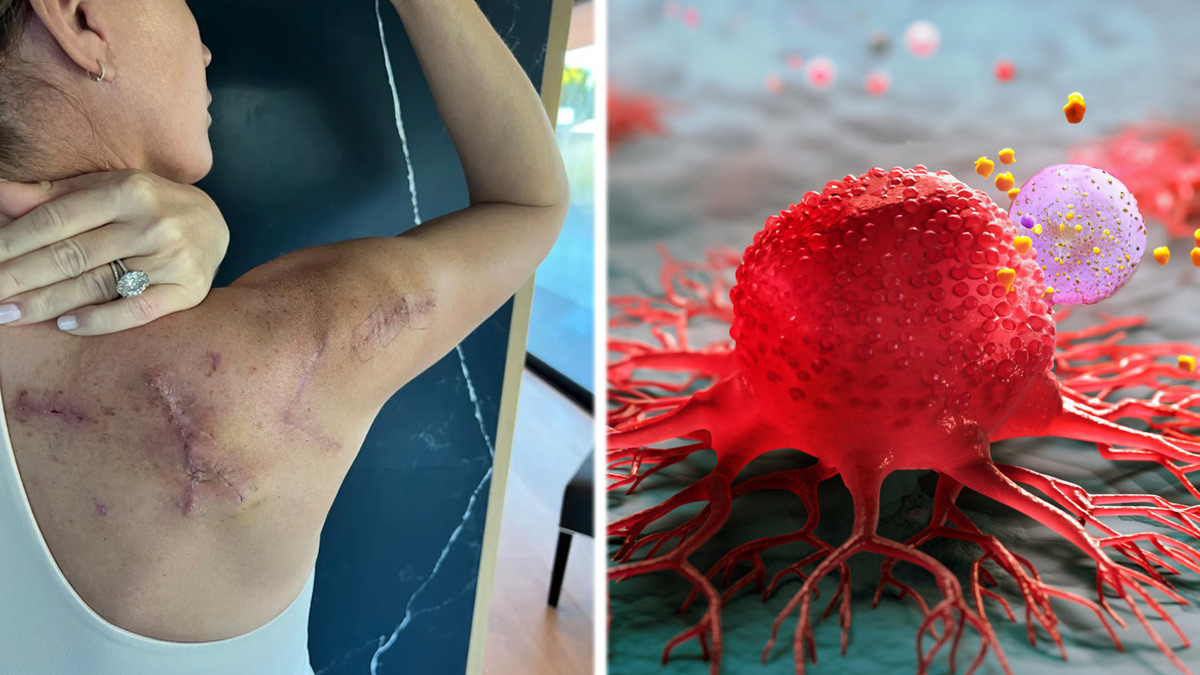
Stage 4 cancer is often described as a battle fought on multiple fronts. Some of them include physical, emotional, and mental. For Teddi Mellencamp, The Real Housewives of Beverly Hills alum, this fight included brain surgery to remove tumours “the size of plums” and a gruelling recovery marked by steroid-induced mood swings. In a recent Instagram post, Mellencamp shared photos of her scars and growing hair, 76 days post-op, while reflecting on her journey. Her story sheds light on the realities of advanced cancer treatment, the toll of brain surgery, and the resilience needed to navigate both.
Table of Content:-
Teddi’s Diagnosis and the “Plum-Sized” Tumours
View this post on Instagram
Mellencamp first revealed her stage 4 melanoma diagnosis in February 2025 after a trip to the ER uncovered tumours in her lungs and brain that had likely been growing undetected for 6–12 months. “I had no idea they were there,” she wrote, describing the shock of learning her cancer had metastasis. The tumours’ size, comparable to plums, highlighted the aggressive nature of her condition, necessitating immediate surgery and targeted therapies.
Brain Surgery and the “Rage of Steroids”
View this post on Instagram
Following her diagnosis, Mellencamp underwent multiple surgeries to remove tumours. Post-op, high-dose steroids, a standard treatment to reduce brain swelling, triggered intense mood swings. “I had rage from the steroids,” she admitted, a common but rarely discussed side effect. Steroids like dexamethasone can cause irritability, insomnia, and emotional volatility, complicating recovery.
Her Instagram post showcased scars from the procedures, including a prominent incision on her scalp, alongside photos of her hair regrowth. “When I first looked at this picture, I cried,” she shared, but later found “peace” in her progress and support system.
Stage 4 Cancer and Brain Surgery: What It Means![stage 4 cancer 3 (97)]()
Stage 4 cancer, or metastatic cancer, occurs when cancer spreads from its origin to distant organs, such as the brain or lungs. Survival rates vary widely, but advances in immunotherapy and targeted therapies have improved outcomes for many patients. Brain surgery in these cases aims to remove tumours causing pressure or neurological symptoms, though risks include infection, bleeding, and cognitive changes.
Dr Mahesh Bandemegal, Surgical Oncologist, HCG Cancer Hospital, Bengaluru, explains that stage 4 cancers usually cannot be cured because the cancer has already spread to organs like the brain, bones, lungs, or liver. However, many treatments can help patients live longer. These treatments improve quality of life by managing symptoms and slowing cancer growth. With proper care, support, and the right treatment, doctors can extend a patient’s life by several years.
A 2023 Journal of Clinical Oncology study notes that 15–30% of melanoma patients develop brain metastases, with survival improving significantly when treated with surgery and newer immunotherapies. However, recovery often involves balancing physical healing with emotional strain, as Mellencamp’s experience underscores.
Recovery After Brain Surgery: The Long Road![teddi mellencamp cancer 1 - 2025-04-29T133036.277]()
Recovering from brain surgery is a marathon, not a sprint. Patients typically spend 5–14 days in the hospital for monitoring, followed by weeks to months of rehabilitation. Key challenges include:
- Physical limitations: Fatigue, headaches, and temporary mobility issues.
- Cognitive changes: Brain fog, memory lapses, or difficulty concentrating.
- Emotional turbulence: Mood swings, anxiety, or depression, exacerbated by steroids.
Mellencamp leaned on horseback riding, family time, and humour to cope. “I’ve laughed a ton, loved on my kids, and felt great,” she wrote, emphasising the importance of small victories.
ALSO READ: Eva Amurri’s Breast Reduction Journey: Why She Called It “Worth It” Despite Painful Recovery
Conclusion
While Mellencamp’s tumours have shrunk or disappeared, she remains vigilant. Her story is a testament to modern oncology’s progress and the grit required to endure it. Stage 4 cancer and brain surgery demand immense resilience, but advances in treatment and emotional support can light the path forward. As Teddi shows, scars are not just reminders of pain-they’re proof of survival.
Also watch this video
How we keep this article up to date:
We work with experts and keep a close eye on the latest in health and wellness. Whenever there is a new research or helpful information, we update our articles with accurate and useful advice.
Current Version
-1745913955729.jpg)
